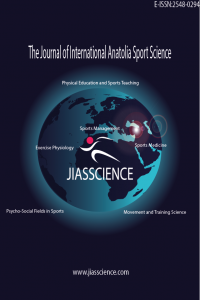KADIN BASKETBOLCULARIN SPOR YAŞINA GÖRE İMGELEME PUANLARININ KARŞILAŞTIRILMASI
Bu çalışmanın amacı kadın basketbolcuların spor yaşına göre imgeleme biçimlerinin karşılaştırılmasıdır. Çalışmaya 1-8 yıl 13, 9-13 yıl 25, 14 yıl ve üzeri 14 kişi olmak üzere 52 kadın basketbolcu katılmıştır. Çalışmada veri toplama aracı olarak Halll ve arkadaşları (1998) tarafından geliştirilen sporda imgeleme envanteri kullanılmıştır. Ölçeğin Türkçe geçerlilik çalışması Vurgun ve arkadaşları tarafından yapılmıştır (2012). Motivasyonel özel imgeleme alt boyutunda 1-8 yıl ile 14 yıl ve üzeri sporcular 9-13 yıl olan sporculardan yüksek bulunmuştur. Bilişsel genel imgeleme, motivasyonel genel uyarılmışlık, motivasyonel genel ustalık alt boyutlarında da 14 yıl ve üzeri olan sporcular 9-13 yıl olan sporculardan yüksek bulunmuştur. Elde edilen sonuçlara göre 14 yıl ve üzeri olan sporcuların imgeleme biçimlerini daha fazla kullandıkları tespit edilmiştir. Bu durumun ortaya çıkmasında uzun yıllar spor yapmanın etkisi olduğu söylenebilir. Bu çalışmanın doğrultusunda yeni spora başlayan sporculara da imgeleme çalışmalarının yaptırılması önerilmektedir.
Anahtar Kelimeler:
Basketbolcular, imgeleme, spor yaşı
THE COMPARISON OF IMAGERY LEVELS ACCORDİNG TO SPORT AGE IN FEMALE BASKETBALL PLAYERS
The aim of this study is to compare female athletes' forms of imagery according to sport age. In total 52 female basketballers, 1-8 years 13, 9-13 years 25, 14 and above 14, have participated in the study. In the study Sport Imagery Questionnaire developed by Hall and his companions (1988) was used as the data collection tool. The validity of the scale for Turkish was conducted by Vurgun and his companions (2012). In Motivational special imagery subdimension 1-8 year over 14 year athletes are found to be higher than 9-13 year athletes. In Cognitive general imagery, motivational general alertness, motivational general mastership subdimensions athletes who are and above 14 years are found to be higher than 9-13 year athletes. According to the obtained results it has been detected that athletes who are 14 year and above use imagery forms more. Doing physical exercise for years can be regarded to have an impact on this result. In accordance with this study it is suggested that athletes who begin sport must be made to perform imagery studies.
Keywords:
Basketball players, imagery, sport age,
___
- Akarçeşme, C. (2004). Voleybolda Müsabaka Öncesi Durumluk Kaygı İle Performans Ölçütleri
- Arasındaki İlişki, Master Thesis, Gazi University Graduate School of Health Sciences, Ankara.
- Boyd, J., & Munroe, K. J. (2006). The use of imagery in climbing, AthleticInsight, The Online Journal of SportPsychology.
- Cumming, J., Hall, C. R., Harwood, C. &Gammage, K. (2002). Motivationalorientations and imageryuse: a goalprofilinganalysis, Journal of Sports Sciences, 20:2, 127-136.
- Dökmen, Ü. (2000). İletişim Çatışmaları ve Empati. Sistem Yayıncılık. 14. Baskı. İstanbul.
- Feltz, D. C., &Riessinger, C. A. (1990). Effects of in vivoimagery and performancefeedback on self- efficacy and muscularendurance. Journal of Sport and ExercisePsychology, 12; 132-143.
- Hall, C.R. (2001). Imagery in sport and exercise.In: Handbook of Research on SportPsychology: (2nd Ed.). R.N. Singer, HA. Hausenblas (Eds.) New York: John Willy&Sons, 538.
- Hall, C.R., Mack, D., Paivio, A., Hausenblas, H. (1998). Imageryusebyathletes: Development of the sportimageryquestionnaire. International Journal of SportPsychology, 29, 73-89.
- Hardy, L., Jones, G., Gould, D. (1997). Understandingpsychologicalprepationforsport. John WilleySons.
- Kızıldağ, E., Tiryaki, M.Ş. (2012).Sporda İmgeleme Envanterinin Türk Sporcular İçin Uyarlanması. Spor Bilimleri Dergisi,23(1): 13-23.
- Kolayiş, H., Sarı, İ., Köle, Ö. (2015). Takım sporlarıyla uğraşan kadın sporcuların imgeleme, güdülenme ve kaygı puanları arasındaki ilişkinin incelenmesi. Spormetre, 13;2: 129-136.
- Konter, E. (1999). Uygulamalı Spor Psikolojisinde Zihinsel Antrenman. Nobel Yayın Dağıtım, Ankara, 8.
- Loehr J. O. (1986). MentalToughness Training for Sports. The Stephen Grene Press; 10.
- Munroe, K., Giacobbi, P., Hall, C., Weinberg, R. (2000). The fourW’s of imageryuse: Where, when, why, andwhat. The SportPsychologist, 14, 119-137.
- Özerkan, K.N. (2004). Spor Psikolojisine Giriş. Ankara: Nobel Yayın Dağıtım, 83.
- Paivio, A. (1985). Cognitive and motivationalfunctions of imagery in humanperformance. CanadianJournal of AppliedSportSciences, 10(4), 22- 28
- Parker, J.K., Lovell, G.P. (2012). Age Differences in the Vividness of YouthSportPerformers’ ImageryAbility. J ImageryResSportPhysActiv, 7(1), 1-13.
- Poon, P., Rodgers, W. (2000). Learning and rememberingstrategies of novice and advancedjazzdancersforskilllevelappropriatedanceroutines. ResearchQuarterlyforExercise and Sport, 71(2), 135- 144.
- Roberts, R., Callow, N., Hardy, L., Markland, D., Bringer, J. (2008). Movementimageryability: Development and assessment of a revisedversion of the vividness of movementimageryquestionnaire. Journal of Sport&ExercisePsychology, 30, 200–221.
- Vurgun, N., Dorak, F.R., Ozsaker, M. (2012). Validity and reliability study of the sportimageryquestionnaireforTurkishathletes. ANALYSIS, 19 (2012): 2-09.
- Weinberg, R.S., Gould, D. (2003). Foundation of Sport and ExercisePsychology, 3th ed, Champaign, IL:HumanKinetics.
- White, A., Hardy, C. (1998). An in-depthanalysis of the uses of imagerybyhigh-level slalom canoeists and artisticgymnasts. The SportPsychologist, 12; 387-403.
- Yalçın, B., Tetik, S., Açıkgöz, A. (2010). Organizasyon ve Yönetim Bilimleri Dergisi, Cilt. 2-2.
- Yayın Aralığı: Yılda 3 Sayı
- Yayıncı: Alparslan İNCE
